Though not yet fully complete, Squamish’s Sp’akw’us Feather Park has dramatically spread one of its wings with its opening this weekend.
It is hard to overstate what this park signifies for the town.
There are undoubtedly those who checked it out this weekend who miss the unscripted version of the former industrial area, with its rough-and-tumble appeal, but that version of Squamish—and the waterfront—is going, going, gone.
Even the naysayers (and the ‘Gosh, it is too windy down here!’ folks) likely had to acknowledge that it was nice to walk down to the water and see parents and tots do the same without having to watch for rebar sticking out of the ground or stare at creosote pilings.
Many of us also likely imagined the cool factor of bringing out-of-town friends and family down to the new pub on a hot day to watch the kiteboarders do their thing in Howe Sound.
And that new stunning playground was certainly packed all day with smiling parents and kids, despite the wind and occasional rain showers.
The influence of Sḵwx̱wú7mesh Úxwumixw (Squamish Nation) youth in designing the playground is a powerful addition to the new best playground in town (the new one at SEAandSKY, across the channel, is a close second.)
After literal decades—through the 2004 purchase of the land by the District, the contentious and dramatic “community visioning process,” and the sale to developer Matthews West (as it is now known) in 2016—it is hard to deny that Oceanfront Squamish has created a beautiful spot for locals and tourists alike.
Walking along the now paved path along the water, with its unique public art, past the Harbour Air dock, it is also hard to deny that there is no going back to the quiet and affordable little mill town we used to be.
Squamish is a destination where folks want to be and be seen.
Soon, there will be a whole new community on the 24 hectares (59.1 acres) of oceanfront land, (and 18 hectares of water lots), with 7,000 new residents.
The transition—some would say gentrification—comes with plenty of pain, particularly in terms of housing prices and pressure on our favourite outdoor spots and resources, but it also comes with plenty of perks, like a playground right on the water, and accessible trails and beaches.
As locals explore this new, shiny waterfront “room” of our collective “house,” many of us will weigh all that we have gained against what it all costs us, figuratively and literally.
Whatever we individually decide, one thing is for sure, collectively, there’s no going back.




